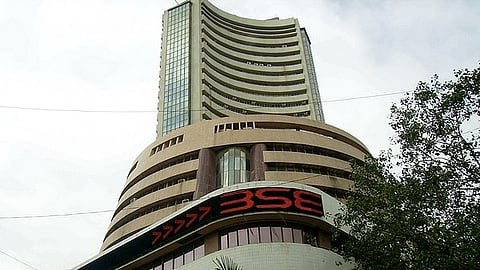

India’s equity markets opened lower on Thursday after US President Donald Trump announced new import tariffs. The Nifty 50 fell 180 points to open at 23,150, while the BSE Sensex dropped nearly 750 points to open at 75,811.
At 2 PM, the BSE Sensex was lower by 310.43 points, or 0.41 per cent, at 76,307, and the Nifty 50 was at 23,262.45, behind by 69.90 points, or 0.30 per cent.
Trump declared a universal 10% baseline tariff on US imports, calling it "Liberation Day," with reciprocal tariffs starting at that rate. While most countries would face the baseline levy, 60 nations—including India—would be subject to higher duties, some as steep as 50%. India's exports to the US will now attract a 26% tariff, which Trump described as a "discounted" rate compared to India’s 52% average tariff on US goods. China, a major US trading partner, faces an increased tariff of 34%.
The announcement triggered a sell-off in global equities, particularly across Asian markets.
Nitin Rao, CEO of InCred Wealth said that what was anticipated has happened with markets globally were actually discounting this expectation with limited gains over 6 months and booming gold prices.
“We are now entering a new world order, and there’s nothing wrong if other countries were having tariff barriers while the US did not, and is now correcting it. Markets will have to price this in, both in terms of sentiment and earnings,” added Rao.
Export-heavy stocks, especially IT and pharma majors extended losses. TCS, Infosys and HCL Technologies fell up to 3% on Thursday Morning. Sectors most exposed include IT (50–60% of revenues from the US ) pharma (30–50%), textiles, gems, auto parts, electronics (iPhones, machinery), and agri-exports like shrimp and spices.
Pranay Aggarwal - Director & CEO of Stoxkart said that the the reciprocal tariffs may trigger short-term volatility in global markets, particularly in sectors like autos, steel, and agriculture.
He added that Indian equities could face pressure due to potential retaliatory measures, impacting export-driven sectors (e.g., pharmaceuticals, IT). The immediate tariff enforcement (excluding autos, effective April 3) suggests urgency, possibly disrupting supply chains. For India, heightened trade tensions may weaken the INR and deter FDI, though domestic stimulus could offset risks. Japan’s auto exports may face headwinds, affecting Nikkei. Globally, risk-off sentiment could strengthen the USD and Treasuries.
“Investors should monitor retaliatory actions and sector-specific exposures. Defensive stocks (FMCG, utilities) may outperform, while cyclical sectors (autos, metals) could underperform. Long-term implications hinge on negotiation outcomes, but near-term caution is advised,” said Aggarwal.
Justin Khoo, Senior Market Analyst - APAC, VT Markets said that with Indian equities trading at a five-year low (18.8× forward P/E), much pessimism may be priced in. Bargain-buying is already emerging in select sectors. “The Indian government’s strategy is measured—seeking to negotiate while supporting exporters. If managed well, this could become a pivot point: a challenge turned into an opportunity for deeper trade rebalancing and renewed investor confidence,” added Khoo.